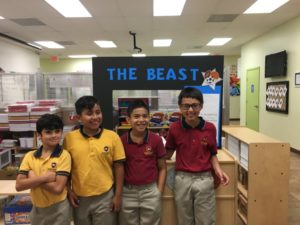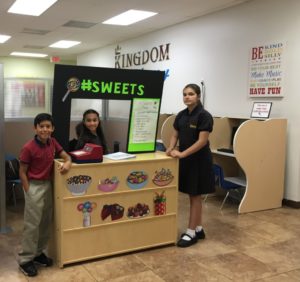MIAMI – On a typical Friday at Kingdom Academy, nine- and 10-year-old entrepreneurs would be chasing profits — for a cause.
Randon Perry would be on the mic, hyping up crowds that gathered around The Stars, a performing-arts enterprise. The boys behind The Beast would offer sports lessons for a fee. The social media-savvy #Sweets hawked confections, but faced stiff competition from Pieces of Joy’s baked goods.
Fourth-graders at this diverse private school in western Miami-Dade County spend their first semester learning business concepts and doing market research. (The proprietors of The Beast found out through a SurveyMonkey poll of their classmates that basketball, football and soccer were the most popular sports.) They launched their ventures in January, offering real products and services to classmates for real money. They split the end-of-year proceeds between Autism Speaks and another charity of their choice.

The animal lovers behind Pieces of Joy sent their profits to PetsSmart Charities. They were the top earners, netting $160 after the cost of supplies. Their flagship product, cake pops, commanded $2 apiece. Daniella Vega, the lead supervisor, explained their appeal: “You can take cake anywhere, and just eat in your hand.”
The school embraces project-based learning, building lessons for each grade around a theme that helps students connect their classroom to the real world.
In Kindergarten, students probed the question: Where does food come from? Fifth-graders explored what makes America’s government different from other governments around the world.
Fourth graders learned what it would take to become a young entrepreneur.
But at Kingdom Academy, children have to demonstrate financial acumen at an even younger age.
Students in each class have a job (they might serve as a sort of IT specialist, for example, helping to set up technology devices). They earn salaries, which can allow them to pay for classroom perks. Unlike the fourth-grade businesses, they don’t use real money. But students still have to save for taxes and monthly rent. If they don’t have enough cash to cover their mandatory payments, they risk penalties like losing their chair for a day — a consequence Elena Navarro, the principal, says students consistently manage to avoid. Students short on make-believe cash can borrow from the classroom banker, but they have to pay off any debts they incur.

Two years ago, Florida became the first state in the country to set learning expectations for students in elementary, middle school and high school based on the Council for Economic Education’s K-12 National Standards for Financial Literacy. The new standards set learning benchmarks for fourth -, eighth- and twelfth-graders.
Kingdom Academy extended the benchmarks to younger students, so children in kindergarten and first grade could begin to master concepts like spending, saving and credit. They’ll need to master those money skills as adults, but the financial curriculum serves another purpose: improving math results.
Iliana Perez, the school’s president and chief financial officer, said it began integrating finance into the curriculum about four years ago, when school leaders realized they needed a better way to help math lessons stick.
“Why don’t we start creating an environment that is business-based, where they have to use their math concepts?” she said, describing the thinking at the time. Complex addition and subtraction can be difficult for the youngest elementary students, but they can grasp the importance of money. “It’s an easy concept, once you understand it through play,” she said.
The new approach seems to be working. The school administers a test known as Measures of Academic Progress three times a year. The assessment system projects learning goals for each student based on their initial results. At the end of the previous school year, teachers and administrators learned they had met their target: More than 85 percent of the school’s 200 elementary school students had reached or exceeded their MAP learning goals.
The school sits on a tiny lot just outside of Kendall. Roughly 60 percent of its K-5 students use Florida tax credit scholarships to pay tuition. Step Up For Students, which hosts this blog, helps administer the scholarship program for low-income students.
In addition to its project-based learning approach, the school draws students with its wraparound services. It provides before- and after-school care from 7 a.m. to 6:30 p.m. It serves three meals a day. It holds family workshops to help parents understand the curriculum and improve their own financial literacy skills, and offers Rosetta Stone to those who are trying to learn English. This summer, the school’s running an Olympics-themed academic camp that also includes swim lessons — a potentially life-saving service in South Florida.
In 2017, Kingdom Academy plans to grow into a larger building that will allow it to serve up to 700 students, including the middle school grades. The current K-5 school, which also includes a preschool, is at capacity, and Navarro, the principal, said she wants it to grow to accommodate parent demand.
“These are not all wealthy families,” she said. “These are families that want the best for their kids.”


